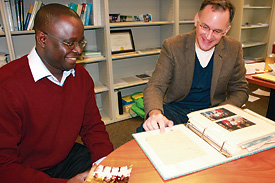Editor’s note: A longer version of this story appears in Global Michigan portal’s Explore Magazine, www.globalportal.umich.edu.
Brian Arbic flipped through a scrapbook from his days as a Peace Corps volunteer teaching math and physics in Ghana nearly 20 years ago. He found an old class roster, neatly written by hand on ruled paper, and pointed to the name of one of his best students — Joseph Ansong.

Brian Arbic (right), assistant professor of physical oceanography and ocean modeling, looks at a scrapbook with post-doctoral student Joseph Ansong, who he met almost 20 years ago during a Peace Corps assignment in Ghana. Photo by William Foreman.
Before leaving the western African nation to pursue an academic career, Arbic visited Ansong, who had moved to a new school. The American was sad to see it was a shabby place with poorly trained teachers who often skipped class. The son of a poor corn farmer, Ansong couldn’t afford a better school. The future didn’t look bright for him.
“I remember thinking that Joseph could have gone to the University of Michigan and succeeded here if he were American,” Arbic says.
After losing touch for decades, the teacher and his former pupil are back together again, this time as colleagues, working in offices next to each other in the Department of Earth and Environmental Sciences at U-M. Their improbable reunion is an inspiring story about the power of idealism, education, hard work and the enduring bonds between teachers and students.
Arbic grew up in Sault Ste. Marie in the Upper Peninsula and majored in mathematics and physics at U-M. Before going to graduate school, he wanted to take a few years off doing something adventurous.
He discussed his options with Ed Diehl, a graduate student in physics at the time. Diehl, now an associate research scientist at U-M, described his experience as a Peace Corps volunteer in Tanzania.
“By the end of that conversation,” Arbic says, “I thought, OK, that’s what I want to do.”
He was sent to the town of Damongo in northern Ghana in 1990 to teach math and physics to nearly 200 students in a high school.
It didn’t take long for Arbic to notice that Ansong was one of the brightest students in the class.
Arbic left a deep impression on Ansong. The bright, energetic and young teacher gave the school a huge boost, the African scholar says.
“It was a remote area, so you didn’t have good teachers coming over. They wanted to stay in the cities,” Ansong says.
Arbic left Ghana in 1993 and earned a doctorate in physical oceanography from the Joint Program between Massachusetts Institute of Technology and Woods Hole Oceanographic Institution before eventually returning to U-M, where he’s an assistant professor of physical oceanography and ocean modeling.
After passing his national exams with Arbic’s help, Ansong moved to another school with a faculty of local teachers. “You had to learn on your own. Take out the textbook and read,” Ansong says.
Despite the challenges, Ansong got into the University of Cape Coast and graduated at the top of his class. He was awarded a scholarship from the University of Twente in the Netherlands, where he earned a master’s degree and developed an interest in fluid dynamics. He earned a doctorate in applied mathematics from the University of Alberta in Canada.
During those busy years, the two men lost touch. But Arbic said that out of the blue in 2008, six of his former students in Ghana e-mailed him independently, thanking him for his teaching and updating him about their lives. He asked the others for Ansong’s address and by searching the Internet found out he was at University of Alberta working with Bruce Sutherland, a professor he knows well.
In late 2010 Arbic began talking to Ansong about the possibility of doing post-doctoral work at U-M. He eventually arrived last May and is part of a National Science Foundation-funded project studying how the ocean dissipates energy and mixes.
Ansong’s success illustrates one of the key takeaways of Arbic’s experience in Ghana.
“I remember telling people the best students there could do well at the best institutions here,” he said, “but they just don’t have the opportunity.”

